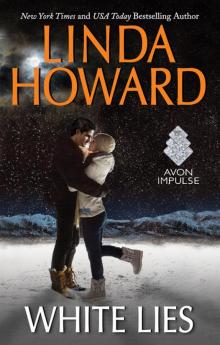Ice Read online
By Linda Howard
A LADY OF THE WEST
ANGEL CREEK
THE TOUCH OF FIRE
HEART OF FIRE
DREAM MAN
AFTER THE NIGHT
SHADES OF TWILIGHT
SON OF THE MORNING
KILL AND TELL
NOW YOU SEE HER
ALL THE QUEEN’S MEN
MR. PERFECT
OPEN SEASON
DYING TO PLEASE
CRY NO MORE
KISS ME WHILE I SLEEP
TO DIE FOR
KILLING TIME
COVER OF NIGHT
DROP DEAD GORGEOUS
UP CLOSE AND DANGEROUS
DEATH ANGEL
BURN
Chapter One
The place never changed.
Gabriel McQueen actually liked that about his hometown, Wilson Creek, Maine. He liked the continuity of it, the security, the solidarity. He liked that his seven-year-old son, Sam, was seeing the town almost exactly as Gabriel himself had seen it growing up. He liked that Sam was building some of the same memories he had.
He liked the little town as it looked during the march of seasons: the budding of spring, the green of summer, the rioting colors of autumn when the twin white steeples pierced a deep blue sky, but his favorite time of the year was right now. The last few weeks leading up to Christmas were special, when excitement and anticipation seemed to grip everyone and the little kids were almost giddy from it all. He could barely wait to see Sam enjoying the same things he’d enjoyed at that age.
He drove his black four-wheel-drive Ford F-250 through the town square, smiling as he saw that every storefront was decorated with tinsel and twinkling multicolored lights, that the big fir tree in front of the courthouse was festooned with so many lights that it looked like a solid blaze that even the cold, steady, miserable mist of rain dripping from the ugly leaden sky couldn’t dim.
There was an empty parking space at the end of the metered row in front of the courthouse, and he squeezed the big pickup between the white lines. Jamming his weatherproof cap on his head, he got out and fed enough change into the old-fashioned meter to buy him two hours. He wouldn’t be there that long, but he erred on the side of caution because it would be embarrassing as hell for the sheriff’s son to get a parking ticket in front of the courthouse on his first day home—not to him, but to his father. Not embarrassing his father was well worth a couple of quarters.
The mist of rain blew in his face; the last weather report he’d checked predicted snow later on tonight when the temperature dropped. Ducking his head against the wind, he quick-timed up the courthouse steps, opened the double glass doors, then took the stairs on the right down to the basement. The sheriff’s department still occupied the basement of the courthouse even though the jail was on the top floor and the arrangement was damned inconvenient, but that was how things had always been and Gabriel figured they would still be that way when he died.
The sheriff’s department was the first door on the left. The door opened into an area filled with four desks, three women, and a lot of attitude. Behind them was another door, and stenciled on it was Harlan McQueen, Sheriff. The stencil had been done almost thirty years before, and in some places the lettering was almost gone, but Gabriel knew his dad was thinking of retiring—had been for the past five or ten years—so, as a thrifty Mainer, he didn’t see any sense in having the doors relettered.
All three women looked up when Gabriel entered, their faces immediately wreathing in smiles. All three jumped up with disconcertingly girlish squeals, considering the youngest was a good fifteen years older than he was, and rushed at him; you’d think he hadn’t seen any of them in a year, instead of just two months. Somehow he managed to almost get his arms around them all; he was a big guy, but three women were a lot for any man, especially when one of the women was pleasantly hefty.
Two of the women wore brown sheriff’s department uniforms; Judith Fournier and Evelyn Thomas were sisters, and their resemblance was strong enough that when they were in uniform and their hair was pulled back and secured per regulations, they were almost indistinguishable. Patsy Hutt, the queen of the outer office, was soft and round and crowned with snow-white hair. Today she wore thick-soled boots, jeans, and a wool sweater decorated with sequined snowflakes. She looked like the most benign woman in the world, but Gabriel had a very clear memory of her swatting his ass when he was about seven and full of self-importance because his dad was the sheriff.
Among the three women, they controlled the outer office and access to the sheriff, ran most of the department, and knew everything there was to know about everyone in the county.
“It’s about time you got here,” Patsy scolded. “I was getting worried, with you driving in and meeting this storm head-on.”
“Storm?” He went on alert, adrenaline surging. “I checked the weather forecast before I headed out; the rain was supposed to turn to snow tonight, but that was all.” That had been this morning, at a motel in Pennsylvania. Before leaving North Carolina he’d put snow tires on his truck because, hell, December in Maine meant snow. That was a no-brainer. Since leaving, though, he’d been listening to XM, so he wasn’t up to the minute on the weather forecast.
Patsy’s concern meant something, however. Mainers were accustomed to winter weather and knew how to handle it, so any looming storm severe enough to get their attention told him a lot about the potential for danger.
Before she could answer, the door behind them opened and all four looked around. “Gabe,” said his father, a wealth of affection and something close to relief in his lined face, and Gabriel tore himself from the clutches of the outer-office tyrants to stride across the floor. He exchanged a brief bear hug with his dad, they clapped each other on the back, then Harlan said, “I’m glad you made it. The weather is turning nasty in a hurry and I need help.”
Gabriel’s level of alertness ratcheted upward several more degrees. If Harlan McQueen was admitting he needed help, then something serious was going on.
“You got it,” he said as they moved on into Harlan’s office, which tended more toward cramped than spacious. The county hadn’t splurged on the department’s offices, that was for damn certain. “What’s up?”
His father’s sharp gaze showed appreciation for Gabriel’s unhesitating support and willingness to act. When he’d been younger, that natural inclination toward action—any action—had sometimes landed his ass in hot water, but as a sergeant in the military police, he’d been able to channel that aggression and decisiveness into the job, which was good for both him and the army.
“This damn weather system is dipping our way,” Harlan said tersely. “We were supposed to get snow, with the ice staying northeast, but now the weather service is saying we’re going to get hammered by the ice. They issued the storm warning just a little over an hour ago, and we’re scrambling to get ready, plus there’s an accident tying up three deputies when I can’t spare even one.”
Shit, an ice storm. Gabriel was on full alert now, his eyes narrowing, his stance subtly shifting as if he could take on the storm in a bare-knuckle brawl. Ice was ten times worse than a blizzard, in terms of damage. Maine had taken two hits from ice in the past ten or twelve years, but both times the storm had missed this area. That was good then, but bad now, because it meant there was a lot of weakened timber that had been spared before but would now be coming down under the weight of the ice, crushing cars and houses, taking down power lines and leaving hundreds of square miles in the cold and dark. Ice was like a crystal hurricane, destroying everything it touched.
“What can I do?”
“Drive out to the old Helton place and check on Lolly. I haven’t been able to get her on her cell phone, and she may not know this weather system has shifted ou
r way.”
Lolly Helton? Gabriel almost groaned aloud. Of all the people—
“What’s she doing here?” he asked, trying to disguise his sudden hostility, which was the way Lolly Helton had always affected him. “I thought the whole family had moved away.”
“They did, but they kept the house for summer vacations. Now they’re thinking about selling it, and Lolly’s here to check things out and, hell, what difference does it make? She’s out there by herself, with no way of calling for help if she gets hurt.”
Despite his reluctance to put himself out for Lolly Helton, Gabriel immediately grasped the logistics of what his father was saying. Anyone who wasn’t from Maine might not be able to read between the lines, but he could. Cell service was spotty at best; if she’d been safely here in town, Harlan would have been able to reach her on her cell phone, but out by the Helton place a cell phone was useless for anything except throwing. And because no one lived in the old house now, the land-line phone service had long ago been disconnected. Probably there wouldn’t be any televisions in the place either, for the same reason. Unless Lolly happened to drive into town and was listening to her car radio, she’d be unaware of looming disaster.
Fuck. There was no way out of it. He had to go after her.
“I’ll take care of it,” he said, striding to the door. “How much time do I have?”
“I don’t know. That’s a higher elevation, the icing will start sooner than it does here. The weather service is saying it could begin here as soon as sundown.”
Gabriel glanced at his watch. Three p.m. This far north, sunset was around four p.m., which didn’t give him much time. “Shit,” he said. “I won’t have time to see Sam.”
“You will if you hurry. The kids were let out of school as soon as the weather service changed the forecast, so your mom has already picked him up. I’ll call her to get some coffee and food ready for you, stop by there on the way, then haul ass.”
He was out the door, moving fast, before Harlan had stopped talking. The coffee and food were more of a necessity than a comfort. He’d been driving all day, he was tired, and in severe weather conditions having something to eat and drink could make the difference between living and dying. He didn’t know what kind of situation he’d be in, once he left the main road and started the long, winding climb toward the Helton place, so it was better to have the provisions and not need them than it was to not have them and maybe die because of it.
The wind slapped him in the face as soon as he opened the courthouse door and stepped out. That wasn’t good. The air had been fairly calm when he went inside, but now, barely ten or fifteen minutes later, it was really blowing. Wind made the tree limbs and power lines come down faster, besides sapping the body heat of every poor fool who was outside, or who was being sent to rescue some bad-tempered bitch with a snotty attitude who was as likely to tell him to go to hell as she was to park her dainty ass in his truck.
Nevertheless, an unholy grin split his face as he sprinted for his truck, unlocking it with the remote while he was still about ten feet away. He wrenched the door open and vaulted inside. Lolly Helton! Damn, nobody else had ever locked horns with him the way Lolly had, or got on his wrong side so easily. He probably owed his success in the army to the early training she had given him; after all, how much trouble could the most fractious recruit be compared to Miss Hoity-Toity Helton?
Lollipop! Want me to lick you, Lollipop?
Putting the gear in reverse, he powered out of the parking space in an arc that left him facing the direction he wanted. His grin grew wider as he shifted into drive and put his boot down on the accelerator. The memory echoed in his head, the taunt that he’d known would drive her over the edge, the laughter of his buddies, the way her tight, unfriendly expression had gotten even tighter as she stared at him as if he were an insect she’d stepped on and smashed flat.
That was the thing about Lolly Helton. Even as a little girl, she’d been so convinced that she was so much better than everyone else in town that nothing he or anyone else had said to her had put a dent in that superiority. Her father was the mayor, and she never forgot it, or let anyone else forget it. If she’d been especially pretty, or especially smart, or anything else out of the ordinary maybe she’d have been more popular in school, but there hadn’t been anything special about her. He remembered her frizzy brown hair, and that nothing she wore had ever looked very good on her, and that was it. Well, except for the way her expression had said Eat shit and die, peasant.
There had to be something wrong with him to actually feel a sort of anticipation at seeing her—and probably arguing with her—again.
Keeping a steady hand on the wheel, he switched the radio from XM to a local station so he could catch any weather updates. Within a few minutes he left the city limits of Wilson Creek behind, speeding up to gain whatever extra seconds he could. Another kind of anticipation built inside him, sharp and strong. Sam. He was going to see his kid again in just a few minutes, and his heart began pounding with joy.
Four miles down the road he turned between two huge spruce trees onto a concrete driveway. Behind the spruce trees was a sprawling white house with neat black shutters and a three-car detached garage. The back door was already slamming open as he lurched to a stop, a small, dark-haired dynamo erupting from the house yelling, “Dad! Dad!”
Gabriel left the truck running and leapt out, barely in time because Sam launched himself upward. He grabbed the kid out of midair, and skinny arms wrapped around his neck so tightly he could barely breathe. He didn’t need to breathe. He just needed to hold his son.
“We got out of school early!” Sam said, beaming at him. “There’s going to be an ice storm. Gran’s making plenty of soup, because she said we’d probably need it.”
“That’s good to hear,” Gabriel said. Sam was wearing a coat but it wasn’t zipped, and the hood had fallen back so the cold rain was falling on his bare head. Gabriel pulled the hood up, then opened the truck’s back door to grab his duffel, shouldering the door shut. Holding his son in one arm and the duffel with the other, he ran through the rain to the back porch. His mother was standing there, trim and capable-looking in her jeans and boots, the wide smile on her face not quite disguising the concern in her green eyes.
“He wouldn’t wait,” she said, throwing her arms around Gabriel and hugging him, then planting a swift kiss on Sam’s cheek as well.
“Ah, Gran,” he said, squirming, but he didn’t wipe his cheek. Gabriel grinned, remembering how mortifying it had been at that age for his mother to kiss him. Sam might as well get used to it, because nothing stopped Valerie McQueen from kissing the people she loved.
He dropped his duffel, set Sam on his feet, then squatted and began rifling through the duffel for his knife and flashlight. “The coffee’s almost ready,” his mom said. “I already have one thermos filled with soup, and here’s one of your father’s insulated rain ponchos.” She gave him the poncho, then turned and hurried back into the kitchen.
“Thanks,” he said, hoping he wouldn’t need it. His boots were all-weather and insulated, so his feet should stay warm and dry, but he tucked an extra pair of socks in his coat pocket, just in case. His coat was thick and heavy and he had gloves in the truck, as well as a blanket that Sam had shoved under the backseat over a year ago and which he’d never gotten around to dragging out. He figured he was as ready for a quick trip up the mountain as he was going to get.
“Where are you going?” Sam asked as he watched the preparations. “You just got here.” Disappointment laced his tone, edging into sulky.
“I have to rescue a woman from her house on a mountain,” Gabriel replied, keeping his own tone brisk so Sam would know this wasn’t the time for an argument, but he put his arm around him for a quick, hard hug. “I don’t want to leave either, but when something needs doing, someone has to step up and do it.”
Sam mulled that over. With Gabriel being career army and his grandfather a sheriff, in hi
s short life he’d heard a lot about responsibility, and seen it in action. He might not like it, but he understood it. “Is she hurt?”
“I don’t think so, but your grandpa wants me to get her before the ice storm leaves her stranded.”
Sam gave a solemn nod. “Okay,” he finally said. “If you have to. But be careful.”
“I will,” Gabriel promised, wanting to grin but keeping his expression grave. His little guy was learning how to step up to the plate himself.
Valerie returned, and he stood to take the two big thermos bottles from her. “Be careful,” she said needlessly, echoing Sam, but now that he was a parent himself he understood that the worry never stopped, no matter how old or how capable he was.
“Aren’t I always?” he asked, knowing that would make her roll her eyes, which it did. He kissed her cheek, then knelt to give Sam another, extra-big hug. “I’ll be back as soon as I can. Can you take care of Gran until then?”
Sam nodded solemnly, and he squared his thin shoulders. “I’ll do my best,” he replied, though the look he gave his grandmother said that he doubted he could control her. Gabriel bit the inside of his cheek to hold back a grin.
“Bring Lolly here,” Valerie said briskly. “Don’t try to take her into town and then make it back. We have plenty of room and plenty of food, so there’s no point in pushing your luck with this weather.”
“Yes, ma’am,” he said obediently, but inside he was thinking: Oh, shit, I’ll be stranded with Lolly Helton.
Maybe she wouldn’t be there. Maybe she was somewhere safe in town, and had simply turned off her cell phone. Maybe he’d slide off the road and have to walk back, and wouldn’t be able to make it up the mountain to the Helton place. Maybe, even if she was there, she’d refuse to go anywhere with him. Yeah, he could see that.

 Mr. Perfect
Mr. Perfect All the Queen's Men
All the Queen's Men Midnight Rainbow
Midnight Rainbow Diamond Bay
Diamond Bay Dying to Please
Dying to Please The Woman Left Behind
The Woman Left Behind Come Lie With Me
Come Lie With Me Drop Dead Gorgeous
Drop Dead Gorgeous To Die For
To Die For Ice
Ice Overload
Overload Shadow Woman
Shadow Woman Veil of Night
Veil of Night White Lies
White Lies Son of the Morning
Son of the Morning The Complete Mackenzies Collection
The Complete Mackenzies Collection Lake of Dreams
Lake of Dreams DeathAngel
DeathAngel Loving Evangeline
Loving Evangeline Burn
Burn Mackenzie's Magic
Mackenzie's Magic Against the Rules
Against the Rules Burn: A Novel
Burn: A Novel A Lady of the West
A Lady of the West Almost Forever
Almost Forever Open Season
Open Season Now You See Her
Now You See Her Prey
Prey Cry No More
Cry No More Sarah's Child
Sarah's Child Angel Creek
Angel Creek Death Angel
Death Angel Kill and Tell
Kill and Tell The Touch of Fire
The Touch of Fire Raintree: Inferno
Raintree: Inferno Killing Time
Killing Time Cover of Night
Cover of Night Tears of the Renegade
Tears of the Renegade Heartbreaker
Heartbreaker The Cutting Edge
The Cutting Edge All The Queen's Men cs-2
All The Queen's Men cs-2 Veil of Night: A Novel
Veil of Night: A Novel Blood Born
Blood Born The Complete Mackenzie Collection
The Complete Mackenzie Collection Mackenzie's Magic m-4
Mackenzie's Magic m-4 Mackenzie's Pleasure m-3
Mackenzie's Pleasure m-3 Raintree
Raintree A Game Of Chance m-5
A Game Of Chance m-5 Prey: A Novel
Prey: A Novel Lethal Attraction: Against the RulesFatal Affair
Lethal Attraction: Against the RulesFatal Affair The Raintree Box Set: Raintree: InfernoRaintree: HauntedRaintree: Sanctuary
The Raintree Box Set: Raintree: InfernoRaintree: HauntedRaintree: Sanctuary The Woman Left Behind: A Novel
The Woman Left Behind: A Novel Dream Man
Dream Man Frost Line
Frost Line Kill and Tell cs-1
Kill and Tell cs-1 Shadow Woman: A Novel
Shadow Woman: A Novel Mackenzie's Mission
Mackenzie's Mission Strangers in the Night
Strangers in the Night Running Blind
Running Blind